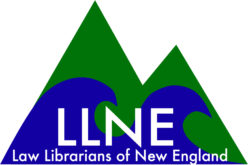Mission
Law Librarians of New England (LLNE) is an organization by and for law librarians and legal information workers based in Connecticut, Maine, Massachusetts, New Hampshire, Rhode Island, and Vermont. Our mission is to nurture the growth and development of our members and to facilitate a regional professional community dedicated to enhancing the status of law librarianship and legal information work.
Goals
Develop a pipeline to the profession:
- Engage in formal outreach to law students, library students, and college students to promote law librarianship as a profession.
- Send representatives to library school job fairs and similar events.
- Advertise LRIP to library students.
- Rebrand the Membership Committee to Membership and Recruitment Committee.
- Create a new section of the website that provides information about the profession.
- Establish a new class of scholarship open to non-member law or library students.
- Explore LLNE-sponsored fellowship programs for current law library students and exchange programs for established law librarians.
Enhance law librarianship and legal information work in New England by sharing its collective and member knowledge:
- Increase collaboration opportunities with public libraries and external organizations.
- Support and advocate for policy initiatives that support affordable, non-restrictive access to legal information, including access to justice, publishing, privacy, artificial intelligence, and algorithms.
- Encourage information and knowledge sharing through increased scholarship.
Provide educational programming to members:
- Poll members for workshop topics to increase applicability of offerings across all library types.
- Provide workshops in a variety of formats, including online, self-paced, and in-person, to reach the greatest number of members.
- Create real-skills themed series of workshops, based on identified competencies.
- Provide a platform for members to share their experience, expertise, and collective knowledge with each other.
- Coordinate work-swap field trips so members can visit other types of libraries.
- Create “day-in-the-life-of” videos for members unable to travel to other locations.
- Tailor meeting topics to the collection strengths and librarian expertise of hosting law library.
- Make substantive programming hybrid to allow for broader attendance.
- Increase and promote financial assistance for meeting attendance.
- Create more educational web content.
